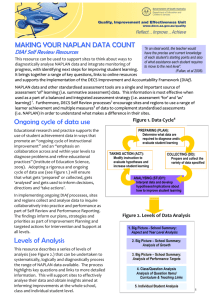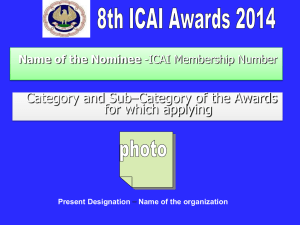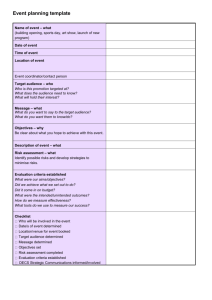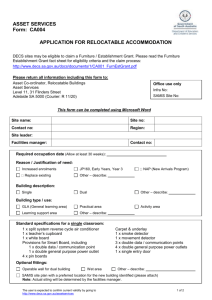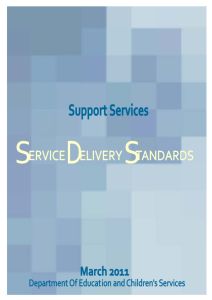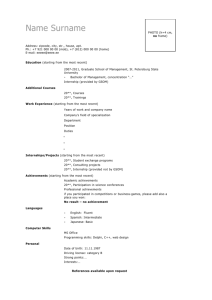EFFECTIVE PERFORMANCE REPORTING
advertisement
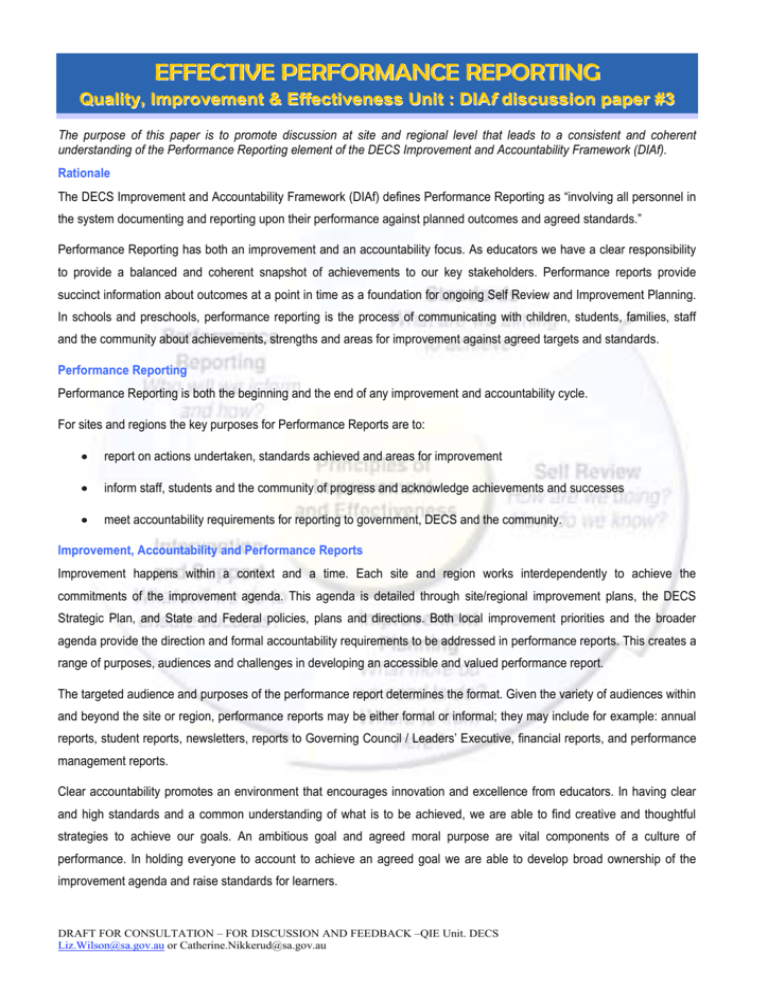
EFFECTIVE PERFORMANCE REPORTING Quality, Improvement & Effectiveness Unit : DIAf discussion paper #3 The purpose of this paper is to promote discussion at site and regional level that leads to a consistent and coherent understanding of the Performance Reporting element of the DECS Improvement and Accountability Framework (DIAf). Rationale The DECS Improvement and Accountability Framework (DIAf) defines Performance Reporting as “involving all personnel in the system documenting and reporting upon their performance against planned outcomes and agreed standards.” Performance Reporting has both an improvement and an accountability focus. As educators we have a clear responsibility to provide a balanced and coherent snapshot of achievements to our key stakeholders. Performance reports provide succinct information about outcomes at a point in time as a foundation for ongoing Self Review and Improvement Planning. In schools and preschools, performance reporting is the process of communicating with children, students, families, staff and the community about achievements, strengths and areas for improvement against agreed targets and standards. Performance Reporting Performance Reporting is both the beginning and the end of any improvement and accountability cycle. For sites and regions the key purposes for Performance Reports are to: report on actions undertaken, standards achieved and areas for improvement inform staff, students and the community of progress and acknowledge achievements and successes meet accountability requirements for reporting to government, DECS and the community. Improvement, Accountability and Performance Reports Improvement happens within a context and a time. Each site and region works interdependently to achieve the commitments of the improvement agenda. This agenda is detailed through site/regional improvement plans, the DECS Strategic Plan, and State and Federal policies, plans and directions. Both local improvement priorities and the broader agenda provide the direction and formal accountability requirements to be addressed in performance reports. This creates a range of purposes, audiences and challenges in developing an accessible and valued performance report. The targeted audience and purposes of the performance report determines the format. Given the variety of audiences within and beyond the site or region, performance reports may be either formal or informal; they may include for example: annual reports, student reports, newsletters, reports to Governing Council / Leaders’ Executive, financial reports, and performance management reports. Clear accountability promotes an environment that encourages innovation and excellence from educators. In having clear and high standards and a common understanding of what is to be achieved, we are able to find creative and thoughtful strategies to achieve our goals. An ambitious goal and agreed moral purpose are vital components of a culture of performance. In holding everyone to account to achieve an agreed goal we are able to develop broad ownership of the improvement agenda and raise standards for learners. DRAFT FOR CONSULTATION – FOR DISCUSSION AND FEEDBACK –QIE Unit. DECS Liz.Wilson@sa.gov.au or Catherine.Nikkerud@sa.gov.au Achieving High Quality Performance Reports For sites and regions, the annual report is the culmination of performance reporting for the year. Effective annual reports demonstrate how well expected standards and agreed priorities are being met and explain variation in outcomes. They promote site and regional achievements and demonstrate that monitoring and evaluation have been conducted to report achievements. DECS requires that schools and preschools prepare an annual report for presentation to their community and that the governing council reports annually to the Minister. The national education agreement (Schedule E) requires that student achievement is reported to parents and carers twice a year against clearly defined learning standards and that school annual reports are published on line and can be accessed through the ACARA web site. The requirements for reporting to the Commonwealth of Australia, the Chief Executive, the local community, students, parents and staff are appropriately addressed through an effective and well-planned performance reporting regimen. A well designed and comprehensive reporting process facilitates high quality reports. “Better Practice in Annual Performance Reporting” (Commonwealth of Australia 2004) suggests that the foundations for better reporting can be built on tools and techniques in four basic areas, summarised as the four “P’s” of reporting: people, planning, processes and presentation. 1 People: One of the key determinants of better performance reporting is the creation of a strong collaborative performance and improvement culture in which every person knows what they are expected to achieve or their contribution to meeting agreed outcomes. There is a direct relationship between the quality of performance reporting and the importance placed on it by leaders. Effective leaders hold people to account for outcomes and involve staff in the process of developing the information to be included within performance reports. Effective Performance Reporting engages staff and students in professional dialogue, monitoring, evaluation and documentations of their achievements. As teachers provide formal and informal reports to children and students about their progress and achievements in the same manner, staff provide formal and informal reports to their community about the site or region’s progress, achievement and identified areas for improvement. Site and regional performance reports provide an opportunity to celebrate successes and to foreshadow future actions and directions based on past achievements. Planning: Sites and regions work with a myriad of competing demands and expectations. A challenge in high quality Performance Reporting is to have in place a sound system to identify, collect and report on the information that needs to be included in a report. Careful planning and design of performance reports will focus on what is important and what is necessary to include for the reader. Quality Performance Reports are the product of ongoing monitoring and evaluation of performance and achievement. Strong links exist between performance reporting and self review, improvement planning, intervention and support and standards. Clear reporting of trends in performance assist in identifying the focus for future improvement. For example, the annual reports, should demonstrate close links between the findings of site self review and the site’s improvement plan. Processes: Quality Performance Reporting relies on effective processes to gather data and monitor progress. To assess and report on progress and achievement in predictable, reliable and consistent ways, sites and regions must identify the practical information and performance data that needs to be collected and recorded throughout the year. Sites that have 11 ANAO Better Practice Guide, Public Sector Governance, Volume 1, July 2003 in Commonwealth of Australia Better Practice in Annual Performance Reporting 2004 DRAFT FOR CONSULTATION – FOR DISCUSSION AND FEEDBACK –QIE Unit. DECS Liz.Wilson@sa.gov.au or Catherine.Nikkerud@sa.gov.au reliable performance information for both external requirements and internal management and review are better able to achieve quality performance reporting. Readers of performance reports need to be assured that the quality and reliability of the data and information included in the report are balanced and accurate. Good quality data supports each school to improve outcomes for all of their students. It informs sites’ approaches to the provision of programs, development of policies, allocation of resources, relationships with parents and partnerships with the community and business. Identifying and using the same measures throughout the annual reporting cycle allows sites to develop strategies based on evidence of past performance, and estimates of future performance by monitoring results and adjusting actions. Performance should be measured against clearly specified outcomes or targets with precise indicators that are focussed on the result to be achieved. Presentation: Performance reports need to be presented in a manner that is accessible and easily understood by their intended audience. Readers need to be confident that the information presented in a performance report is even-handed and informative and that it is based on evidence about the achievements of the site or region. Good performance reports use plain English. They are ethically constructed and maintain a transparent and honest approach while protecting the privacy of individuals. Formal reports in particular, exemplify high standards in editing and publication. They provide an accurate and objective assessment of the current state and acknowledge the site or regional context. Data and tables can be used to report what has happened but narrative about the context allows an exploration of why something happened or why it was approached in a particular way. Inquiry questions In reflecting on Performance Reporting, key questions may include: What performance reporting processes are in place currently? What are areas of strength and opportunities for improvement in our current performance reports? PEOPLE: How do staff in the site or region contribute to the development of effective performance reports? PROCESSES: How can reporting processes clearly communicate progress, achievement and effectiveness? PLANNING: How will we document the evidence and data that are gathered to monitor progress towards agreed targets and report achievement? How often will this occur? PRESENTATION: How can we create performance reports that are coherent, concise and balanced? How do we build links and consistency between performance reporting and the other DIAf elements (Standards, Self Review, Improvement Planning and Intervention and Support)? DRAFT FOR CONSULTATION – FOR DISCUSSION AND FEEDBACK –QIE Unit. DECS Liz.Wilson@sa.gov.au or Catherine.Nikkerud@sa.gov.au
